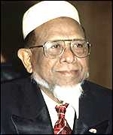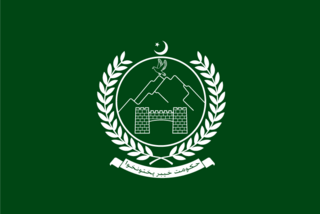Related Research Articles

Sheikh Mujibur Rahman, often shortened as Sheikh Mujib or Mujib and widely known as Bangabandhu was a Bangladeshi politician, statesman and Founding Father of Bangladesh who served as the first President and later as the Prime Minister of Bangladesh from April 1971 until his assassination in August 1975. Mujib is credited with leading the successful campaign for Bangladesh's independence from Pakistan. He is revered in Bangladesh with the honourific title of "Bangabandhu" which is used around the world. He was a founding member and eventual leader of the Awami League, founded in 1949 as an East Pakistan–based political party in Pakistan. Mujib is considered to have been a fundamental figure in the efforts to gain political autonomy for East Pakistan and later as the central figure behind the Bangladesh Liberation Movement and the Bangladesh Liberation War in 1971. Thus, he is regarded as the "Jatir Janak" or "Jatir Pita" of Bangladesh. His daughter Sheikh Hasina is the current leader of the Awami League and currently serves as the Prime Minister of Bangladesh.

The Bangladesh Awami League, often simply called the Awami League or AL, is a centre to centre-left political party in Bangladesh and one of the major political parties in Bangladesh, being the ruling party of Bangladesh since 2009.

The prime minister of Pakistan is the constitutional head of government of the Islamic Republic of Pakistan, designated as the "Chief Executive of the Islamic Republic".

Sir Khawaja Nazimuddin was a Pakistani politician and one of the leading founding fathers of Pakistan. He is noted as being the first Bengali to have ruled Pakistan, first as a Governor-General (1948–51), and later as a Prime Minister (1951–53).

The Bengali language movement was a political movement in former East Bengal advocating the recognition of the Bengali language as an official language of the then-Dominion of Pakistan in order to allow its use in government affairs, the continuation of its use as a medium of education, its use in media, currency and stamps, and to maintain its writing in the Bengali script.

Tajuddin Ahmad was a Bangladeshi politician and statesman. He led the Provisional Government of Bangladesh as its prime minister during the Bangladesh Liberation War in 1971 and is regarded as one of the most instrumental figures in the birth of Bangladesh.
Shah Azizur Rahman was a Bangladeshi politician who served as the Prime Minister of Bangladesh. However, he was the subject of considerable controversy for his collaboration with the Pakistan Army against the struggle to Independence of Bangladesh.

Abdus Samad Azad was a Bangladeshi diplomat and politician. He was elected to Bangladesh's parliament five times from 1970 to 2001. He was also elected Member of Lower Assembly in the Parliament of the then East Pakistan. He became President of the Muslim Student Federation of All - Asam in 1946 and led the Language Movement in 1952.

Mizanur Rahman Chowdhury was a Bengali politician, most notable for serving as Prime Minister of Bangladesh from 9 July 1986, to 27 March 1988.

East Bengal was a geographically noncontiguous province of the Dominion of Pakistan covering present-day Bangladesh. With its coastline on the Bay of Bengal, it bordered India and Burma. It was located close to, but did not share a border with, Nepal, Tibet, the Kingdom of Bhutan and the Kingdom of Sikkim. Its capital was Dacca.

The East Pakistan Provincial Assembly, known as the East Bengal Legislative Assembly between 1947 and 1955, was the provincial legislature of East Pakistan between 1947 and 1971. It was known as the East Bengal Assembly from 1947 to 1955 when the provincial name was changed. The legislature was a successor to the Bengal Legislative Council and the Bengal Legislative Assembly, which were divided between East Bengal and West Bengal during the partition of Bengal in 1947. It was the largest provincial legislature in Pakistan. Elections were held only twice in 1954 and 1970.

Muhammad Mansur Ali was a Bangladeshi politician who was a close confidant of Sheikh Mujibur Rahman, the founding leader of Bangladesh. A senior leader of the Awami League, Mansur also served as the Prime Minister of Bangladesh in 1975.

The Khyber Pakhtunkhwa Assembly is the unicameral legislative body of the Khyber Pakhtunkhwa province in Pakistan. It was established under Article 106 of the Constitution of the Pakistan. The assembly previously had 124 elected members, 99 regular seats, 22 seats reserved for women and 3 seats for Non-Muslims. After the merger of FATA with the Khyber Pakhtunkhwa Province, the assembly seats rose from 124 to 145 by adding 16 general seats, 4 seats reserved for women and 1 for a Non-Muslim.

The independence of Bangladesh was declared on 26 March 1971 at the onset of the Bangladesh Liberation War by Bangabandhu Sheikh Mujibur Rahman; the following day the declaration was broadcast by Major Ziaur Rahman in a radio broadcast. On 10 April, the Provisional Government of Bangladesh issued a proclamation on the basis of the previous declaration and established an interim constitution for the independence movement.

From 1947 to 1956, the Dominion of Pakistan was a self-governing country within the Commonwealth of Nations that shared a monarch with the United Kingdom and the other Dominions of the Commonwealth. The monarch's constitutional roles in Pakistan were mostly delegated to a vice-regal representative, the governor-general of Pakistan.

The princely states of Pakistan were former princely states of the British Raj which acceded to the new Dominion of Pakistan between 1947 and 1948, following the Partition of (British) India and its independence.
Hafiz Mohamad Ibrahim, also spelled as Hafiz Muhammad Ibrahim (1889-1968), was a leader of Indian National Congress. He was governor of Punjab, India in 1965. Ibrahim was a member of Rajya Sabha from 1958 to 1962 and served as union minister of power and irrigation. He was leader of the Rajya Sabbha from 1961 to 1963. He served as Communication and Irrigation minister for United Provinces (1937–50). محمد زمان راجڙ

All Pakistan Awami Muslim League was a Pakistani political party founded by Huseyn Shaheed Suhrawardy in February 1950. Pir of Manki Sharif and Khan Ghulam Mohammad Khan from the North-West Frontier Province (NWFP) joined it soon afterwards.
Fazlur Rahman was a Bengali politician and lawyer. He was the first Education Minister of Pakistan and a member of the 1st and 2nd National Assemblies of Pakistan.
Shaikh Karamat Ali was a Pakistani Muslim League politician from Punjab, Pakistan.
References
- ↑ "Pakistan". The Commonwealth Relations Office List 1952. London: Her Majesty's Stationery Office. 1952. p. 171.
- ↑ Zaheer, Hasan (1998). "The Denouement". The Times and Trial of The Rawalpindi Conspiracy 1951: The First Coup Attempt in Pakistan. Karachi: Oxford University Press. p. 17.
- ↑ Rahman, S. (1982). Conservatism and Liberalism in Pakistan's Constitution Assembly. Peshawar: Vanguard Books. p. 97.
This article needs additional or more specific categories .(September 2022) |